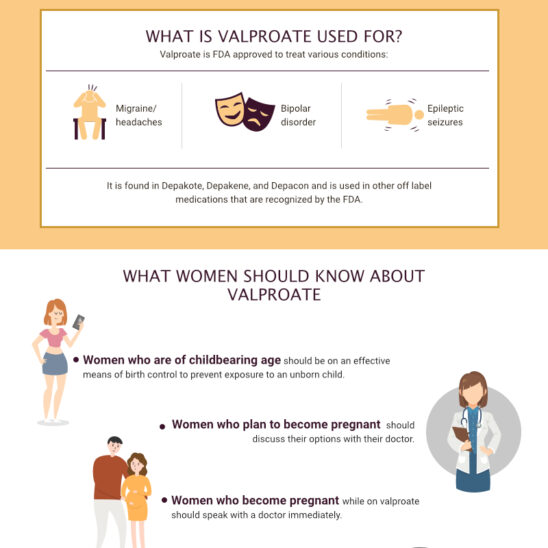Valproate is FDA-approved to treat various conditions, including migraine headaches, bipolar disorder, and epileptic seizures. It is found in Depakote, Depakene, and Depacon and is used in other off-label medications that are recognized by the FDA.
(Article continues below infographic)
______
Valproate is known to cause birth injuries and developmental disorders in babies. Doctors have a responsibility to inform their patients of the dangers of this drug if they plan to have children or are currently pregnant. Injuries from valproate will have a lifelong effect on a child. Malpractice lawyers can assist parents with their right to compensation for medical care and future care.
Birth Defects Caused from Exposure to Valproate
There is an increased risk of birth injuries and developmental disorders with babies whose mothers took valproate-containing medications while pregnant. Based on research, the FDA released an alert that children who were exposed to valproate in utero showed reduced cognitive scores when tested at age three. Research has shown that babies exposed to valproate could suffer from:
- Spina bifida
- Autism
- Developmental delays
- Decreased IQ
What Women Should Know About Valproate
Before prescribing a drug containing valproate, a doctor should advise his or her patients about the risks associated with its use. The FDA has listed the drug as a Category X drug. They have determined that for some conditions, like migraines, the risks outweigh the benefits and safer drugs should be prescribed; especially for pregnant women.
It is recommended that women who are of childbearing age be on an effective means of birth control to prevent exposure to an unborn child. Women who plan to become pregnant should discuss their options with their doctor.
For women who become pregnant while on valproate, it is important to speak with a doctor immediately. It is not recommended to suddenly stop taking valproate because it can cause serious or life-threatening medical problems. The FDA recommends that valproate should only be used as a last resort if other treatments fail to control the medical condition it is used for.
When valproate has been used during a pregnancy, it is recommended that the mother speaks to her doctor about enrollment in the North American Antiepileptic Drug Pregnancy Registry. The baby’s pediatrician should also be made aware that he or she has been exposed to valproate during pregnancy.

